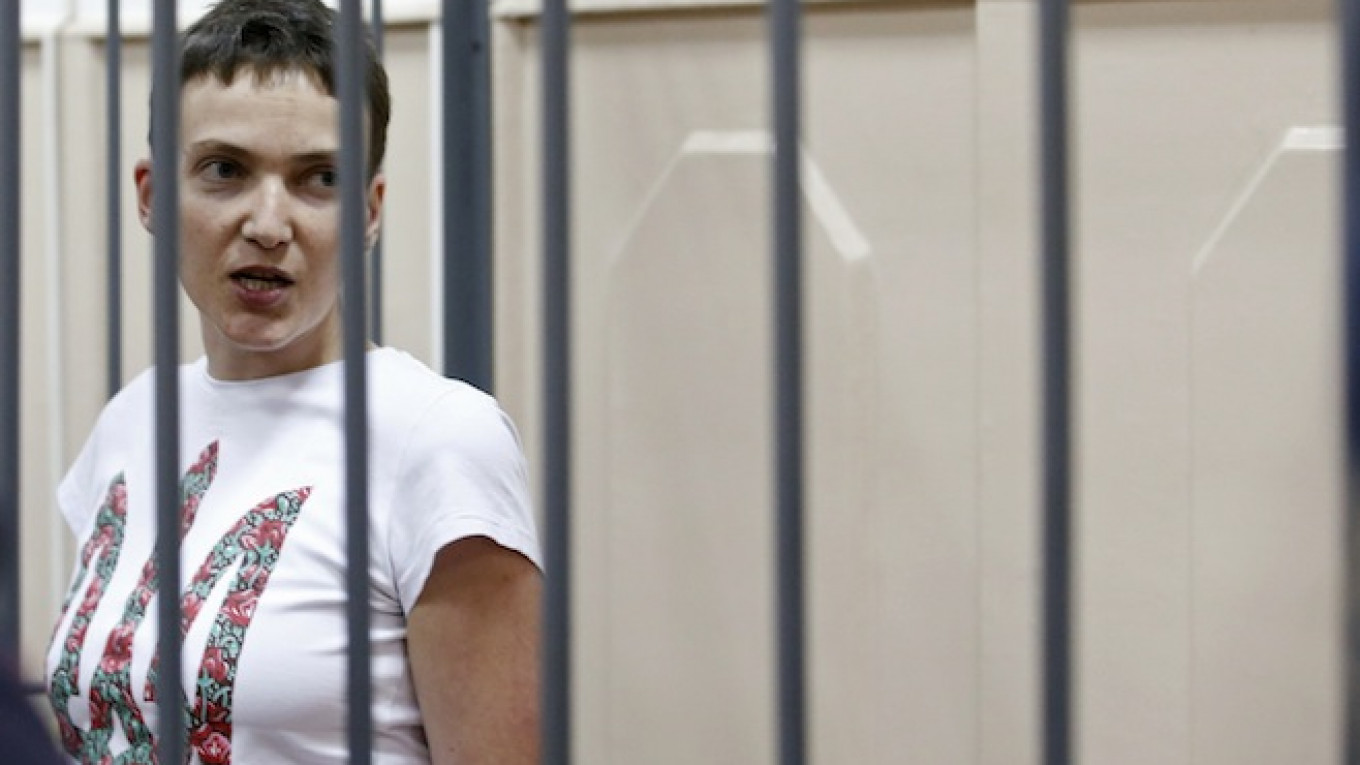More than seven in 10 Russians aware of the trial against Ukrainian pilot Nadezhda Savchenko believe the proceedings were fair, and that the 22-year prison sentence sentence handed down by a Russian court was either “just” or even “too lenient,” a poll released Thursday indicated.
About 85 percent of Russians either have been following the case with varying degrees of attention, or at least were aware of it, a poll by the Independent Levada Center indicated.
Among those who acknowledged any knowledge of the case, 72 percent said the trial was fair, objective and unbiased. Another 7 percent said the trial was somewhat unfair, followed by 3 percent who viewed it as completely rigged, according to the report.
The trial has been widely criticized in the West and in Ukraine, where Savchenko has emerged as a symbol of resistance to Russia's interference. She has been elected to Ukraine's legislature and to the Parliamentary Assembly of the Council of Europe.
Many Russians may be unfamiliar with the criticism of the trial, however: A vast majority of the nation receives news from television, according to polls, but all major networks are controlled by the state and follow the Kremlin's line.
In Moscow, whose population tends to be more Western-leaning and better-skilled in foreign languages than the nation as a whole, and where access to the Internet — and to online media sources — is more widespread, poll results marked a few small differences.
Nearly everyone in the city — or 97 percent — have either heard about the case or were following it, Levada reported.
Belief in the trial's fairness was slightly lower in Moscow than in the country as a whole: About 63 percent of Muscovites viewed it as more or less balanced, while 17 percent disagreed.
The 22-year prison sentence is regarded as “fair and objective” by 51 percent of people in Russia, while another 22 percent view it as “too lenient,” the poll indicated.
In Moscow, those numbers stood at 47 percent and 17 percent, respectively, according to the poll.
Critics of the verdict comprised about 5 percent of respondents in Russia who said the sentence was too harsh, and another 6 percent who supported describing the verdict thusly: “it was not a judicial decision, but a showcase slaying of a Ukrainian servicewoman.”
In Moscow, those numbers stood at 8 percent and 11 percent, respectively.
Savchenko has gone on lengthy hunger strikes while imprisoned in Russia, voiced her views through letters and statements, and derided court proceedings from her defendant's cage. But few in Russia sympathize with her protests.
Only 5 percent of Russians view Savchenko's expressions of protest with admiration, sympathy or respect, the Levada Center poll indicated. In Moscow, the number stood at more than 6 percent.
Meanwhile, 18 percent of Russians feel “irritation” about the pilot's protests, followed by 16 percent who feel “contempt,” and 12 percent who feel “indignation.” About 43 percent said they were indifferent.
In Moscow, the choices of irritation, contempt and indignation scored at 18 percent, 14 percent and 7 percent, respectively. Another 53 percent of Muscovites pled indifference, the Levada Center reported.
The poll was conducted March 25-28 among 1,600 adults from 137 cities and towns around Russia, by face-to-face interviews at respondents' homes. The margin of error does not exceed 3.4 percentage points. No separate methodology data was provided for Moscow.
A Message from The Moscow Times:
Dear readers,
We are facing unprecedented challenges. Russia's Prosecutor General's Office has designated The Moscow Times as an "undesirable" organization, criminalizing our work and putting our staff at risk of prosecution. This follows our earlier unjust labeling as a "foreign agent."
These actions are direct attempts to silence independent journalism in Russia. The authorities claim our work "discredits the decisions of the Russian leadership." We see things differently: we strive to provide accurate, unbiased reporting on Russia.
We, the journalists of The Moscow Times, refuse to be silenced. But to continue our work, we need your help.
Your support, no matter how small, makes a world of difference. If you can, please support us monthly starting from just $2. It's quick to set up, and every contribution makes a significant impact.
By supporting The Moscow Times, you're defending open, independent journalism in the face of repression. Thank you for standing with us.
Remind me later.






